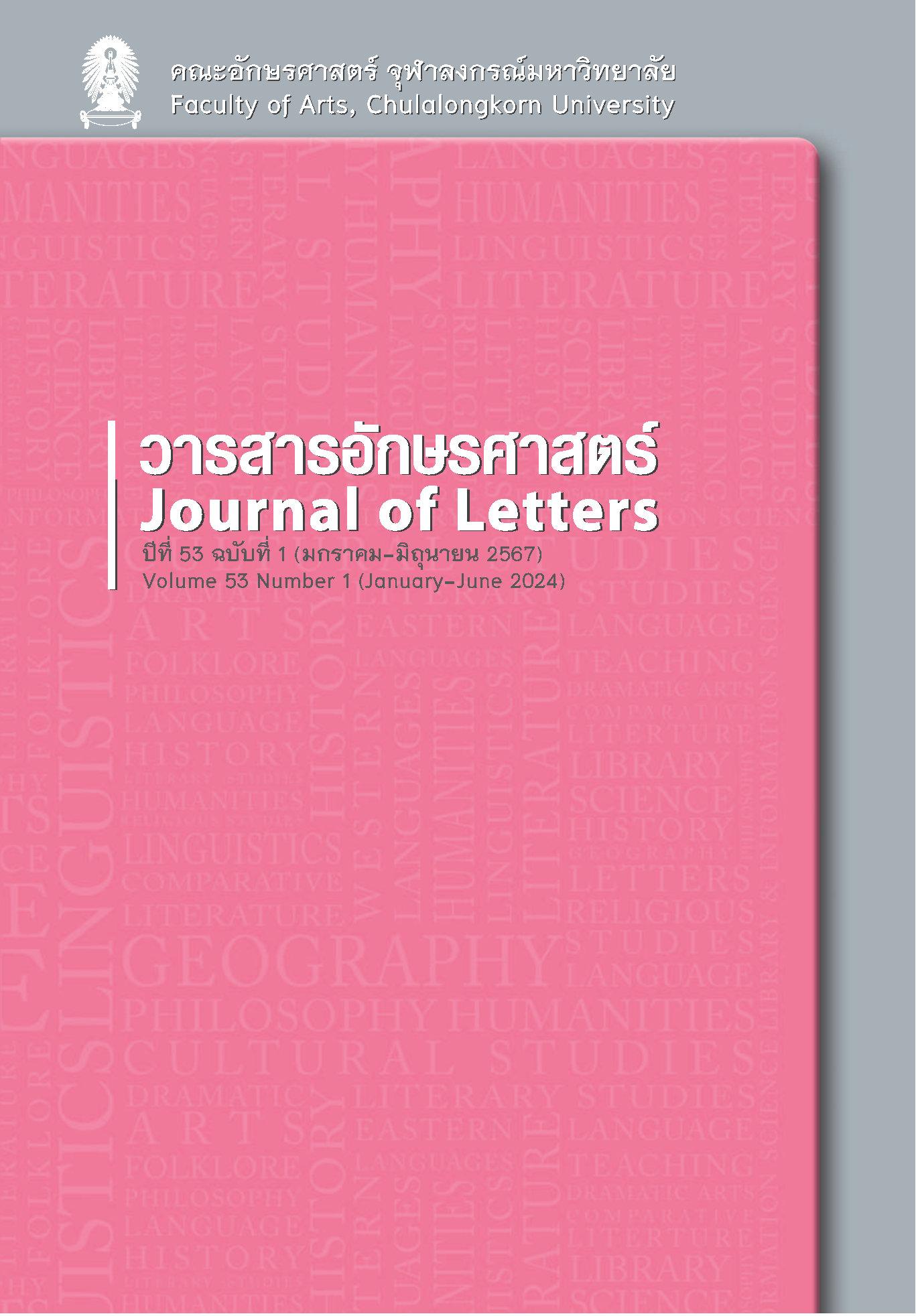An Investigation on Translation Strategies of Korean Literary
Keywords:
Korean translation, translation strategies, titles translation, translation of literary titles, Korean literatureAbstract
The purpose of this research article is to analyze and explain strategies for translating Korean literary titles into Thai. By analyzing the titles of 170 literary titles from 7 publishing houses by collecting names from www.naiin.com between August - September 2023 and use the names of the translated literary works to analyze the strategies for translating the titles from Korean into Thai, applying Nord's theory of translating movie titles. Considering translations of Korean literary titles, overall analysis results found that the most used strategy was translating the title by changing the original title, found at 42.94 percent. The least usedstrategy was using the original title found only 0.59 percent. In addition, there was an analysis of title translations classified by publishers. It was found that 6 out of 7 publisherspreferred to use changing the original title strategy significantly. And considering translations divided by literary type, it was found that the most popular translation strategy for translating psychology and personal development literature books was setting new titles, found at 41.13 percent. Other types of literature include short stories, novels, and business and marketingbooks were found that the title translation was most popular using the strategy of changing the original title. And at the end of this article, the research results are used as guidelines for teaching and learning about translation for Korean language major student as well.
References
ภาษาไทย
Chalikarn Janthajumrusrat ชลีกาญจน์ จันทจำรัสรัตน์. (2019). Kolwithi karn plae chue papphayon action tang pratet pen phasa Thai กลวิธีการแปลชื่อภาพยนตร์แอ็คชั่นต่างประเทศเป็นภาษาไทย [The strategies of foreign action movies translation into Thai]. Warasarn maha jula wichakarn วารสารมหาจุฬาวิชาการ [Mahachula Academic Journal], 6(1), 254–264.
Rujjanee Jeerakamol รุจนี จีระกมล. (2022). Kolwithi karn plae chue lakorn Kaoli bon website Netflix กลวิธีการแปลชื่อละครเกาหลีบนเว็บไซต์เน็ตฟลิกซ์ [Translation strategies for Korean dramas titles on the Netflix website]. Warasarn manutsat lae sangkomsat mahawitthayalai Ubon Ratchathani วารสารมนุษยศาสตร์และสังคมศาสตร์ มหาวิทยาลัยอุบลราชธานี [Humanity and Social Science Journal], 13(1), 135–157.
Supannee Pinmanee สุพรรณี ปิ่นมณี. (2021). Kwammai kup karn plae ความหมายกับการแปล [Meaning and Translation]. CU Press.
Wanna Saengaramruang วรรณา แสงอร่ามเรือง. (2020). Tritsadi lae lak karn plae ทฤษฎีและหลักการแปล [Theories of translation]. CU Press.
The Free Encyclopedia of Culture สารานุกรมเสรีด้านวัฒนธรรม. (2019). Wannakam wannakadee lae wannasil วรรณกรรม วรรณคดี และวรรณศิลป์ [Literature, literature, and literary arts]. Retrieved February 4, 2024, from https://wiki.m-culture.go.th/index.php/วรรณกรรม_วรรณคดี_และวรรณศิลป์
Winess Juntawongsri, Norawat Panbanjong, Suphat Chamchan, & Natthira Tuptim วิเนศ จันทะวงษ์ศรี, นรวัฒน์ ปานบรรจง, สุพัฒน์ แจ่มจันทร์, และณัฏฐิรา ทับทิม. (2022). Karn seuksa kolwithi karn plae chue rueang anime chak phasa Yipun pen phasa Thai การศึกษากลวิธีการแปลชื่อเรื่องอานิเมะจากภาษาญี่ปุ่นเป็นภาษาไทย [A study of translation methods in Anime from Japanese to Thai]. Warasarn aksara pibul วารสารอักษราพิบูล [Aksara Pibul Journal], 3(1), 33–46.
Downloads
Published
How to Cite
Issue
Section
License

This work is licensed under a Creative Commons Attribution-NonCommercial-NoDerivatives 4.0 International License.
Copyright and plagiarism
Authors are responsible for obtaining permission to use copyrighted materials from copyright owners. Authors are responsible for observing requisite copyright law when quoting or reproducing copyrighted materials. Quotations and reproductions of content from other published sources must be accompanied by a reference and all sources should be clearly listed in the references section. Quotations and reproductions of content from external sources without due attribution could be considered a severe infringement of academic conduct and may constitute a legal offence under the Copyright Act of B.E. 2537. Any legal ramifications arising from the infringement of copyright regulations would be the sole responsibility of the author(s).



